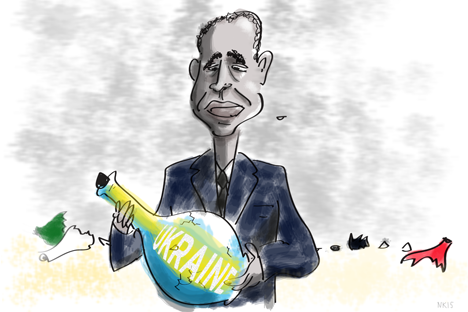BY
The Ukraine crisis triggered a broader crisis in the West-Russia relationship. What are the stakes and the bets today?
First, the declared objective of the EU’s Ukraine policy is to have it firmly integrated in a Greater Europe. We have no problem with that. But why act secretly and unilaterally, rather than openly and multilaterally? We had always been told by the EU that a routine Association Agreement with Ukraine was in the works. But then, all of a sudden, it turned out that a Deep and Comprehensive Free Trade Agreement was going to be part of that. We were told that it was none of our business. Why, then, not full membership?
The Financial Times admitted that “in Ukraine’s case, the European Neighbourhood Policy’s mechanical approach blinded EU policy makers in 2013” and said “such mistakes should be avoided”. A report by the House of Lords EU Sub-Committee on External Affairs in February also concluded that the EU “sleepwalked” into the crisis. Alfred Tennyson’s line “Someone had blunder’d” comes to mind. Why lay the blame for one’s errors at Russia’s door?
Second, we will never put up with a war by proxy on our border. When we got the response from Nato generals’ mouths, rather than their guns’ muzzles, it would have been laughable, had it not been for the death and destruction wrought by Kiev’s Orwellian anti-terrorist operation (ATO). The New York Times rightly described Kiev’s decision not to extend the June truce as a fateful step.
Ed Lucas, writing in The Times in August, was appalled by the prospect of the West “bankrolling indefinitely a failing state, run by corrupt politicians, oligarchs and paramilitary thugs”. So far, it looks like prophecy. Kiev still insists on the military solution, which undermines the Minsk agreement and efforts by the Normandy Four (France, Germany, Russia and Ukraine).
Third, President Obama admitted in a CNN interview in February that the US “had brokered a deal to transition power in Ukraine”, ie, behind the backs of German, French and Polish foreign ministers who helped reach the February 21 deal between President Yanukovych and the parliamentary opposition. For Russia, when the cause of Ukraine’s territorial integrity was lost in the coup, the interests of the people on the ground became of paramount concern.
Fourth, Russia is accused of waging effective propaganda, with the West and Brussels’ eurocrats “outgunned”. Maybe they cannot accept the truth: the ATO and its consequences. But first, the West cannot explain why Kiev has chosen war over political settlement. Where are European values and the ideas of the Maidan?
Finally, on rules-based order and Russia’s revisionism. In this particular case the EU laid down the rules of unilateralism which we thoroughly followed. There was no formal post-Cold War settlement in Europe. The Ditchley Foundation conference recently recognised the need for “a new security system” in Europe.
George Friedman of the US-based analyst Stratfor told the Chicago Council on Global Affairs that the Ukraine crisis represents America’s grand strategy to establish a cordon sanitaire to keep Russia and Germany apart. Hopefully, the Europeans will not allow their continent to be raped by divide-and-rule tactics.
The revisionism outcry betrays politics and policies of the status quo, which are challenged not only by Russia, but by the EU electorate. The present systemic European crisis testifies to the unsustainability and untenability of an order and mindset, rooted in the Cold War era.
Alexander Yakovenko is Russian Ambassador to the United Kingdom. He was previously Deputy Minister of Foreign Affairs.
 Geostrategic Media Political Commentary, Analysis, Security, Defense
Geostrategic Media Political Commentary, Analysis, Security, Defense





